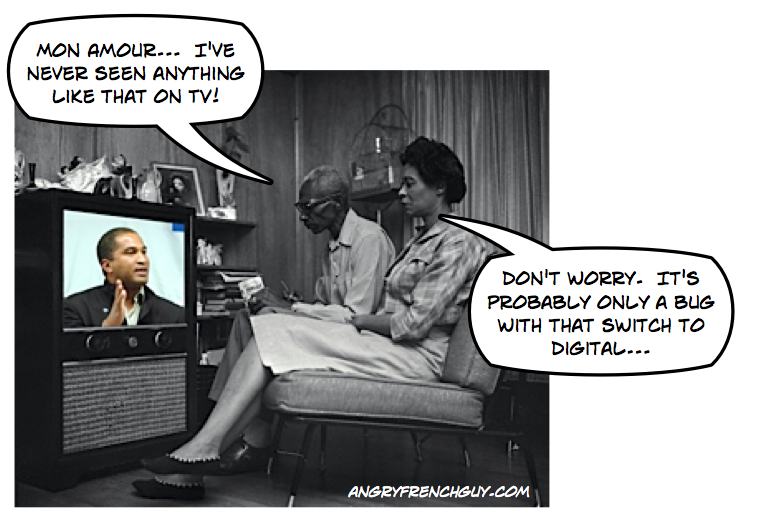Québec has no Colour TV

Québec’s TV industry is huge. For a country it’s size, with a potential public of only a a few million viewers, most of whom understand English and are perfectly able to tune in to the American TV networks that make up at least half of the channels of any cable subscription, the vitality of Québec’s TV is simply astonishing.
Québec’s television is also very high quality television with well-written dramas like Les Invincibles, sitcoms like Tout sur moi innovative talk-shows like 3600 Secondes d’Extase. Québec’s TV rarely feels small-time and production values are often world-class. Star Académie, Québec’s weekly reality/talent show, is an extravaganza of massive production numbers featuring American and French guest stars that makes American Idol look like community television. Seriously.
There is only one major problem with Québec’s television. It’s not in colour yet.
This week AngryFrenchGuy talked to Frédérick Isaya, a young community activist and budding actor about this time bomb that is just waiting to blow up in Québec’s face.
Who are you Fred?
I am a community activist on Montreal’s South shore with a 12 to 17 year olds, an actor and the father of two kids. I’ve been a member of Québec’s Union des artistes for three or four years. I’ve been acting since my teens, but never as a full time occupation. It’s something I do, but not something I gave up everything for.
You wrote a memoir for last year’s Bouchard-Taylor Commission in which you said that Québec’s TV does not represent Québec’s identity properly. What do you mean?
When you look at TV today, the socio-cultural image you see is anachronistic. It is the image of a Québec that is gone. Long gone, I should say. At some point we have to come to terms with that because we are creating many different little parallel societies that don’t include each other. The mass media is the spearhead, of the cornerstone of the collective imaginary. It has to look like us or else we are creating division and people will watch their TV somewhere else and not take part in Québec society. It’s not healthy for anyone.
The consequence of this is that people who don’t live in Montreal have no idea what Montreal looks like. If they only see black people on TV who are up to no good, or Chinese people who are in the Asian mafia, or Arabs preparing a terrorist coup… If that’s the only images they have of cultural communities because they don’t know them in any other way, you can’t unify Québec. We have to change this and change it right now. We can’t wait. The clock is ticking.
Why is it like this?
I really don’t know. I’d rather think it’s a form of indifference or of negligence rather than think it’s deliberate, because if it is deliberate it scares me.
How does it work with casting calls? Can you show up for any role or are you only expected to come if it specifically says: Black guy?
We often face closed-minded people who make pretty restrictive casting calls, but, fortunately, it’s more and more common to see some « all ethnicities welcome » castings. There’s a role for a police officer, a mason or a doctor, and the police officer, the mason and the doctor can be anybody. Every time I see that, I’m reassured. But all to often, right after that I see another breakdown that specifically reads « White man » or « White woman », and when you read the role you just can’t figure out why.
You know, if they’re looking for an actress to play the wife of (union leader Michel) Chartrand during the second world war, I can understand they don’t want a black or a Chinese woman! But when there is no reason… if it’s only because the person in front of you imagined a white woman, I think we are getting awfully close to racism.
What are you going to do about it?
I decided if I didn’t get involved, I was going to be responsible for my own failure. I went to the annual assembly of the UDA (Union des Artistes) and brought up the issue. I think I got things started. A committee was formed to look into all groups excluded from television. You should see things starting to move in 2009. Maybe not on television, just yet, but you will hear about people starting to get involved.
Last year you ran in both the federal and provincial elections as a Bloc québécois and a Parti québécois candidate. Many English-speaking people in Canada still associate sovereigntists with exclusion. What do you have to say about that?
I don’t understand why people associate sovereignty with exclusion. Maybe Parizeau’s message has something to do with it, but it’s been 13 years…
You can’t forget that M. René Lévesque is the instigator of visible immigration in Québec. Before 1976 mass immigration in Québec was essentially an immigration of Caucasian people. M. Lévesque did not hesitate to encourage immigration from French-speaking Africa and Haiti because he felt we needed French-speaking immigrants to solidify the sovereignty project.
There are many people in the Parti québécois think integration is a good thing, but there have not been many concrete acts by the governments of the last 30 years. Including the Parti québécois governments. I would be a hypocrite to say anything else.
Maybe that’s why people associate integration difficulties with the sovereigntists. Even though there have been many federalist governments in the last 30 years, in Québec we are having difficulties with integration of cultural communities, and so, by extension, as a kind of doubtful extrapolation, people associate that with the Parti québécois and the sovereigntist movement. But it’s not about a political party. It’s about everyone.